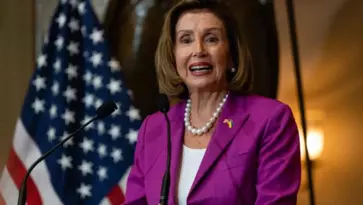Published: August 12,2022
By Wang Xuekun

THE RECENT PROVOCATIVE visit by Speaker of the US House of Representatives Nancy Pelosi to China’s Taiwan region, in serious violation of the one-China principle and the provisions in the three China-US joint communiqués, aroused a major tension across the Taiwan Strait and in the Asia-Pacific region. Once again, it brought to home that the US is the biggest troublemaker for regional stability. A big question mark is put on the role the US is playing in today’s world.
Meanwhile, there are some odd fallacies about this visit. Those fallacies only serve one purpose–to justify an overt trample on a country’s independence, sovereignty and dignity. Among them are:
Fallacy 1:Taiwan’s status is undetermined
It’s a disregard of the history and legal facts. Taiwan has been an inalienable part of China’s since ancient times. Since as early as 1335, the Chinese central government has exercised effective jurisdiction over Taiwan. Taiwan was ceded to Japan in 1895 as a result of a defeated war and put back under China’s sovereign jurisdiction in 1945. Then it came the Chinese civil war. The defeated Nationalists retreated to Taiwan and set up a regime there, from which the Taiwan question arose. However, China’s sovereignty and territorial integrity have never been divided, and the fact the two sides of the Strait belong to one and the same China and that Taiwan is part of China has never changed. This has been enshrined in the UNGA Resolution 2758 adopted in 1971. As a basis for the establishment of diplomatic relationship, the one-China principle has been recognized by as many as 181 countries, including the US.
Fallacy 2: China is unilaterally changing the status quo of the Taiwan Strait
It is an outright lie and slander. In the first place, it should be made clear that, a separatist regime in Taiwan is by no means the status quo. There is only one China in the world, and Taiwan is part of China. This constitutes the status quo of the Taiwan Strait. Indeed, this status quo has been broken, not by China, but by the US and the separatists forces in Taiwan. Pelosi’s visit to Taiwan is just a case in point, showing the whole world the attempts and behaviors of the US to hollow out its one-China policy, a solemn commitment made by itself in 1979.
Fallacy 3: Pelosi’s visit manifests support of US to Taiwan’s democracy
It is a hypocritical pretext. Don’t make the whole world a fool: the Taiwan question is about sovereignty of China, not democracy. The US is using democracy as a pretext to infringe on China’s sovereignty, like what it is doing to so many developing countries, including Rwanda. Democracy is a value held dear by humankind, and it should not be reduced to a cheap and convenient tool to interfere in internal affairs of other countries, nor a self-deceiving cover for separatism.
Fallacy 4: China overreacts to Pelosi’s visit
It is a serious misinterpretation. Pelosi’s reckless move, to say the least, seriously undermines China’s sovereignty, seriously interferes in China’s internal affairs, seriously violates the commitments made by the US side, and seriously undermines peace and stability across the Taiwan Strait. It is only natural that China makes a firm response. China’s reactions are justified, reasonable and lawful. They are aimed at not only upholding China’s sovereignty, but also safeguarding the principle of respecting sovereignty and territorial integrity, a norm universally recognized by the community with a shared future.
Fallacy 5: China, not US, is to blame for the tension
It is a willful calling-white-black. The facts and events that have led to cross-Strait tension are crystal clear. It is the US side that made provocations, created the crisis, and keeps escalating the tense situation. Behind that are the US’s insidious calculations to serve its domestic political agenda and the interests of its politicians, to gain from stoking confrontation or inciting divisions in our region. On the part of China, we have made utmost diplomatic efforts to avoid this crisis that is imposed on us. We believe all fair-minded people can tell right from wrong.
Fallacy 6: China runs against the consensus of the international community
It is a sheer bluffing. The G7 Foreign Ministers’ Statement on August 3rd is cited as the consensus of the international community. First of all, it is a wrong move for G7 to make groundless accusations against China’s justified and legitimate measures, to defend the perpetrators and to pressure on those who set up for themselves. For that reason, the G7 statement is not worth the paper it is written on. Secondly, G7 is too far away from the international community. The times of colonialism, in which the affairs of the world were dictated by a handful of powers, has long passed by. What we see is that more than 100 countries, along with some international organizations, have stepped forward to reiterate their firm commitment to the one-China policy, and express understanding and support for justified position of the Chinese side. Mr. António Guterres, the UN Secretary-General stated that the UN will continue to adhere to UNGA Resolution 2758. This is the unified voice of the justice of the international community, and the voice we should listen to.
Chinese State Councilor and Foreign Minster WANG Yi has recently expounded Chinese positions on Taiwan question at many occasions. And the newly released white paper, “The Taiwan Question and China’s Reunification in the New Era” has elaborated on China’s visions, policies and moves on Taiwan question in a comprehensive manner. With all those efforts, we hope a correct conception would be forged, and fallacies be rectified.
Wang Xuekun is Chinese Ambassador to the Republic of Rwanda.
The views expressed in this article are of the author.
Newtimes
 Africa -China Review Africa -China Cooperation and Transformation
Africa -China Review Africa -China Cooperation and Transformation
